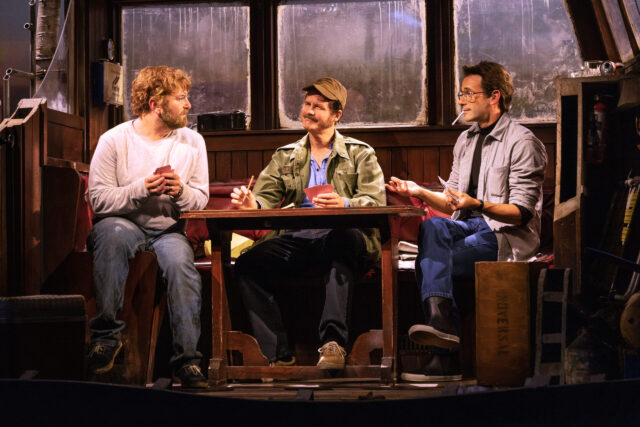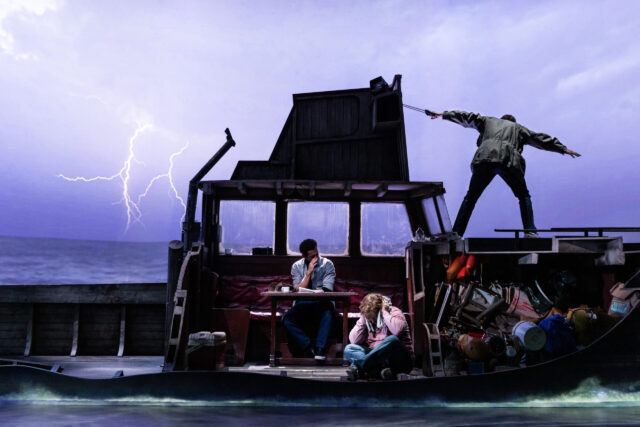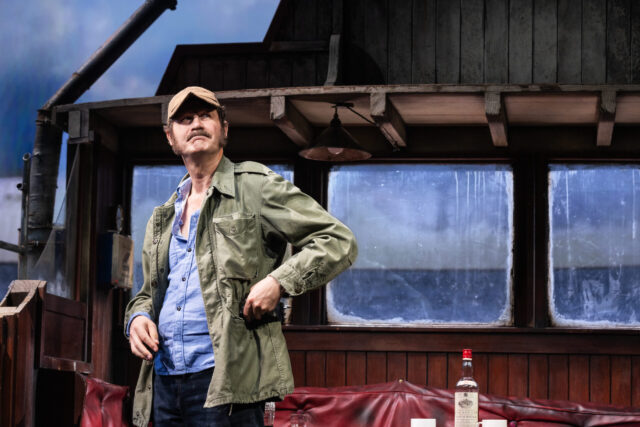
Richard Dreyfuss (Alex Brightman), Robert Shaw (Ian Shaw), and Roy Scheider (Colin Donnell) find plenty of downtime in The Shark Is Broken (photo by Matthew Murphy)
THE SHARK IS BROKEN
Golden Theatre
252 West Forty-Fifth St. between Broadway & Eighth Aves.
Tuesday – Sunday through November 19, $58-$215.50
thesharkisbroken.com
The first two adult books I read were Ernest Hemingway’s The Old Man and the Sea and Herman Melville’s Moby-Dick, when I was in fourth grade. (I discovered only when I was in college that the latter was actually the Reader’s Digest Condensed version; I should have realized that by the opening sentence, which was “Call me Ish.”) A few years later, I devoured Peter Benchley’s Jaws, at least in part because the novel took place on Long Island, where I had spent most of my childhood. Not yet a teenager, I then saw the movie, which was actually filmed on Martha’s Vineyard, when it was released in the summer of 1975. It scared the hell out of me, and I loved every second of it.
I might not have loved every second of The Shark Is Broken, the Broadway play that goes behind the scenes of the making of the film, but I enjoyed enough of it to make it more than seaworthy.
English actor Ian Shaw was four years old when his father, Oscar-nominated actor, novelist, and playwright Robert Shaw (From Russia with Love, A Man for All Seasons) was on set alongside eventual two-time Oscar nominee Roy Scheider (The French Connection, All That Jazz) and soon-to-be Oscar winner Richard Dreyfuss (American Graffiti, The Goodbye Girl). Robert died in 1978 at the age of fifty-one, when Ian was only eight. In 2017, Ian read his father’s drinking diary, which, he explains in an online letter, he found “painful and very brave.” That was the impetus for The Shark Is Broken, which he cowrote with Joseph Nixon and premiered at the 2019 Edinburgh Fringe.
There is no curtain at the Golden Theatre, where the play opened August 21. Onstage is a cross-section of the Orca, the ramshackle lobster boat owned by salty shark hunter and WWII veteran Quint, Shaw’s character. Scheider (Colin Donnell) is playing new police chief Martin Brody, a former New York City cop who has moved to the supposedly much quieter beach community with his family. And Dreyfuss (Alex Brightman) is portraying oceanographer Matt Hooper, who has been brought in for his expert advice.
The three men sling testosterone around for ninety-five minutes as they wait for Bruce, the mechanical shark, to be repaired yet again; it keeps breaking down, giving the actors time to talk about their careers and for Shaw and Dreyfuss to lace into each other, with the cool and calm Scheider as referee.

The Shark Is Broken goes behind the scenes of the making of Jaws, storms and all (photo by Matthew Murphy)
The neurotic, Jewish Dreyfuss, who is from Queens, declares, “What a god-almighty fucking waste of time! This whole thing is a disaster.” New Jersey native Scheider, who spends most of the downtime reading the newspaper and catching rays, closely following the Nixon-Watergate story, says, “Well . . . it’s not the time it takes to take the take that takes the time. . . . It’s the time it takes between the takes that takes the time to take the take.” Dreyfuss responds, “How much time did that take you?”
Complaining about the way Steven Spielberg is directing the film, shooting on the ocean and constantly making changes to the script, Dreyfuss argues, “Jews should stay away from water. Nothing good ever happened to any Jew on the water.” Scheider asks, “Didn’t Jesus walk on water?” Dreyfuss concludes, “Yeah! Look what happened to him!”
Meanwhile, Shaw preys on Dreyfuss’s lack of worldly knowledge. “You’re a philistine, boy!” he declares. When Dreyfuss admits he has never heard of Damon Runyon, saying “You can’t expect me to know everything,” Shaw barks back, “I think our mistake is expecting you to know anything.” A few minutes later, Dreyfuss asks, “What, you think I’m an idiot?” to which Shaw replies, “I presume that’s a rhetorical question.”
The interplay among the three is like the scar scene in the film, when the three men show off their scars and share other intimacies, including discussing their relationships with their fathers, ultimately bonding if not exactly becoming best buds. Shaw has hidden bottles all over the boat, Scheider can’t get enough of the blazing sun, and Dreyfuss is a young, highly ambitious nervous wreck. Certain that he was a failure in American Graffiti and that his lead role in The Apprenticeship of Duddy Kravitz will not get him the respect he craves, Dreyfuss yearns to do Shakespeare and Pinter, just like the grizzled Shaw has done, all the while both seeking Shaw’s approval and desperately wanting to best him.
The structure of the play, directed with a loose hand by Guy Masterson (Morecambe, One Flew Over the Cuckoo’s Nest), is as rickety as the Orca; the narrative centers around the most poignant moment in the film, Quint’s speech about having survived the July 1945 sinking of the USS Indianapolis, the ship that delivered components for Little Boy, the atomic bomb dropped on Hiroshima. But the scene doesn’t involve Bruce at all, so it is never quite clear why they are waiting around for the mechanical shark to be fixed before proceeding with the shooting. Jaws is essentially a character study constructed around greed, from the Amity mayor’s refusal to close the beaches as the great white attacks continue during the profitable July 4 weekend to humans’ belief that they have any power at all over the natural world. The Shark Is Broken is a vastly entertaining character study as well, but there’s not a whole lot more meat on its bones. In the play, Dreyfuss asks, “What do you think it’s about?”; he’s referring to the movie, but the same can be said of the show.

Ian Shaw cowrote and stars as his father, Robert Shaw, in The Shark Is Broken (photo by Matthew Murphy)
In addition, the dialogue is filled with bons mots that wink at what happened after the film; some of them are funny, but others are too obvious. “One thing’s for certain — if there is a sequel, I will not be in it,” Scheider says; he was back for Jaws 2. Reading the paper, Scheider remarks, “Christ! There will never be a more immoral president than Tricky Dicky,” a cheap laugh no matter what you think of 45. And when the three men talk about their families, Scheider asks Shaw about his children (the English actor had ten with three wives), “Do any of yours want to be actors?” Shaw replies, “Christ, I hope not! It’s a shrivelling profession, isn’t it?,” a sly reference to Ian.
Duncan Henderson’s set and costumes put the audience right on board the cutaway Orca, surrounded by Nina Dunn’s effective projections of the sea and storms, enhanced by Jon Clark’s lighting and Adam Cork’s sound and interstitial music.
Donnell (Anything Goes, Love’s Labour’s Lost) is steadfast and hunky as Scheider, who is a calming influence among the three actors. Brightman (Beetlejuice, School of Rock) is uncanny as Dreyfuss, looking and sounding so much like him that you will sometimes forget it isn’t Dreyfuss himself. And in his Broadway debut, Ian Shaw (War Horse, Common) pays wonderful tribute to his father, capturing his essence in every word and move while depicting his virtues and his flaws.
“There is no folly of the beast of the earth which is not infinitely outdone by the madness of men,” Ishmael says in Moby-Dick. It’s a line that also relates to a trio of actors portraying three very different men, each with his own unique form of madness, hunting a mechanical shark in a make-believe Hollywood movie.
[Mark Rifkin is a Brooklyn-born, Manhattan-based writer and editor; you can follow him on Substack here.]